Exploring SSEES’s incredible donation drive to send vital aid to Ukraine
24 February 2023
On the anniversary of Russia's invasion of Ukraine, UCL VPEE student journalist Joshua Robinson looks at the efforts of the UCL School of Slavonic and East European Studies (SSEES) community to help those living in a besieged Ukraine.
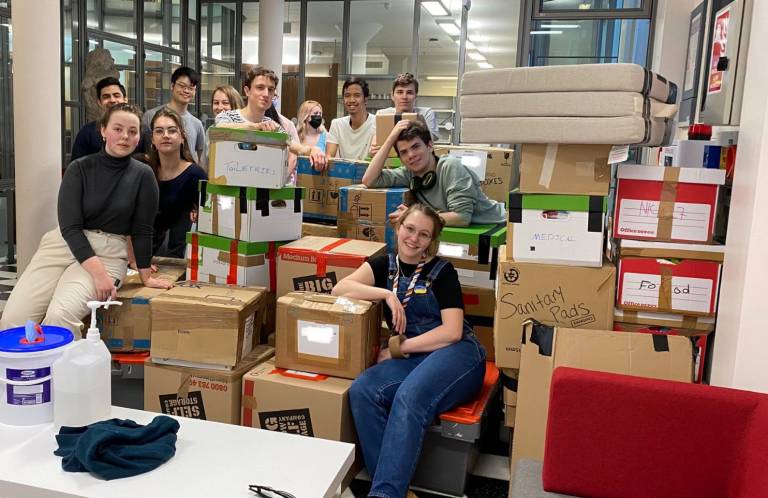
Russia’s war on Ukraine has warped city life into something unrecognisable. Between sirens and the indiscriminate levelling of parks and apartments, the hum of generators allows small semblances of normalcy to continue. Cafés still serve hot coffee in paper cups. Supermarkets, however, open their doors intermittently. It is cold, and alternates between rain and sleet. At night, trundling trams flicker between the shapes of dark, scarred apartment blocks. Any scarce electricity is coddled in city metros and transport, which have become the go-to phone charging hubs due to the installation of USB ports on the underground network. Queues at cash machines wind around the block during windows between outages. Clothes are washed not when they are dirty or the basket full, but when they can be. Emergency surgery is performed in the dark, and non-emergency surgery is not performed.
Three days after the February invasion began, the student-run SSEES (School of Slavonic and East European Studies) society started collecting to provide relief for Ukraine’s increasingly difficult humanitarian situation. Former SSEES-society president and Masters student Freya Proudman and head of the Ukrainian society Anton Korchagin led the charge.
When Freya rocked up to SSEES with two plastic tubs to collect canned food, however, she was not expecting to meet a precarious mountain of hundreds of bags, tubs and boxes piled chaotically in front of her. Word-of-mouth and a vibrant online campaign had produced results.
UCL’s fledgling collections have snowballed into thousands of boxes of life-saving items shipping direct to Ukraine monthly. SSEES and the Ukrainian society have together collected non-perishable foods, first-aid kits, foil blankets, tourniquets, haemostatic gauzes, crutches, power banks, gloves for removing rubble, coats and boots.
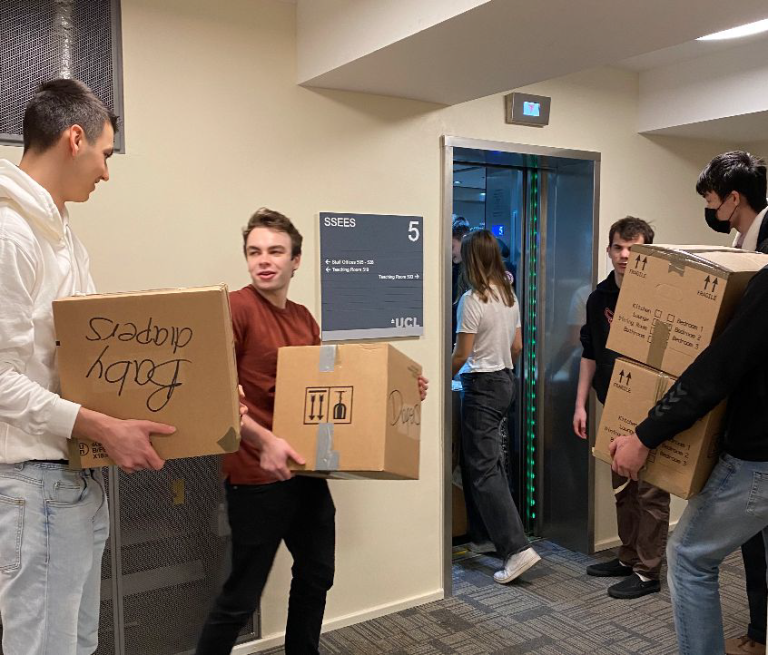
The overwhelming support from students spilled over into the local community as donations came into the library from members of the local London community and small, medium and large businesses, including London Belmont Lions Club, TWS Partners, and Prophet Consulting. Freya told us about the motivations behind the drive, its successes, and challenges for the new year.
Freya said, “We just knew we had to do something. We had the resources. We had the students. We had the space to store the stuff. And most importantly, we had the connections to get it to Ukraine.”
Through links with alumni and current students, the SSEES Society has been able to work with an international Ukrainian shipping company to get items to their destination. Such connections have been particularly valuable, as labyrinthine post-Brexit shipping paperwork was a serious initial challenge for getting the drive off the ground.
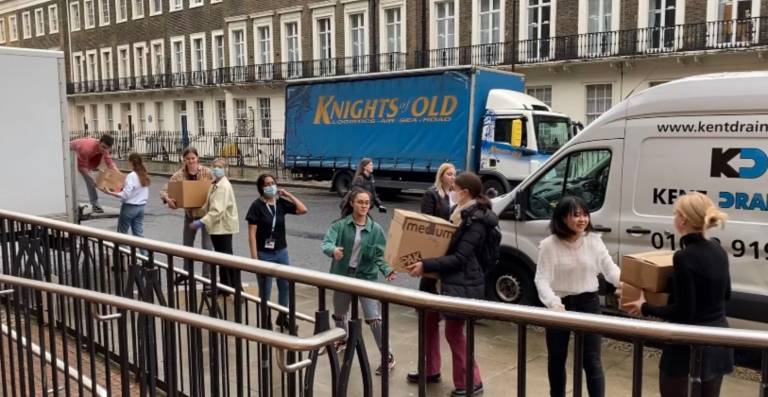
The SSEES library’s academic inventory also came under serious strain from deposits of empty boxes and SSEES-stamped containers across the fifth floor, arranged into brickwork-towers by industrious UCL librarians who struggled to acquire enough boxing to contain donations in a way meeting export requirements. Each box has to be securely packaged and correctly labelled to be allowed to pass international borders.
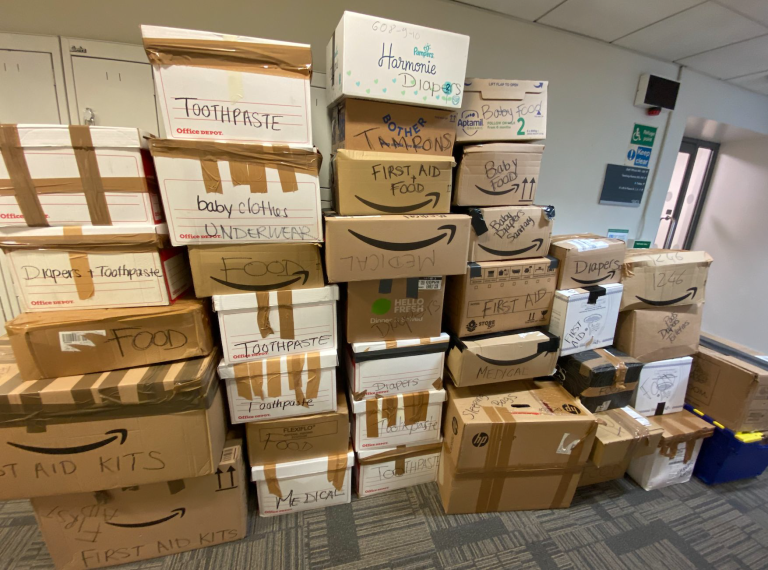
Students would initially bring what they had, Freya says, which usually consisted of non-perishable foodstuffs such as rice and pasta. As the conflict escalated through the year to become less discriminate and more aggressive in the targeting of power infrastructure and medical facilities, the demands for humanitarian aid became more specific. To keep a finger on the pulse of what people needed in real time, UCL SSEES soc began working with the Red Cross and the KHARPP project in August, the latter a charity established by a SSEES alumni to provide relief to heavily embattled Kharkiv in the East of Ukraine.
In one particularly ingenious episode, KHARPP’s collected UK ambulances for cities under fire, hitherto empty. By the end of 2022, each ambulance would swing by a local London warehouse for a fill-up of life-saving equipment before driving across Europe to where they are needed most.
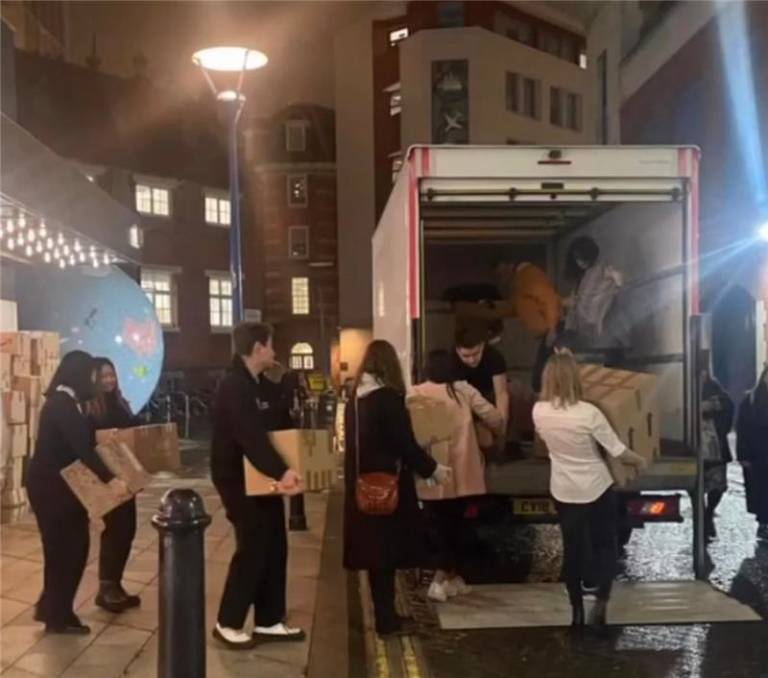
Blackouts mean that power generators and any aid that assists with energy and charging infrastructure is a priority.
“We take word from people on the ground, so we listen to all our friends and contacts there in Ukraine or at the Polish border [where KHARPP works]. Anything so that people have electricity and light as much as possible.”
The donation drive is accepting items once again. You can see here what they’re most in need of, and where to order these items online if you want to help out. Alternatively, donations may be directly delivered to the department during specific times if in coordination with the UCL SSEES Society, who can be contacted at uclsseessoc@gmail.com or @sseessoc on Instagram.
Want to get involved with KHARPP? Find out more here.
More Ukraine events for your radar:
Ukraine one year on – lessons learnt on how to respond to humanitarian crises
6 March, 2:30-3:30pm: Online
Preventing and responding to humanitarian emergencies is a growing global priority. Conflicts, disasters, pandemics and the growing impacts of climate change demand new understanding and new ways of working.
24 February sadly marks one year since the war in Ukraine started. Come and hear from humanitarian experts as they reflect on the past year, discuss the practical dilemmas humanitarians face today, and why different skillsets and disciplines are essential for responding and preventing humanitarian emergencies. You’ll also hear about a new Humanitarian Policy and Practice MSc programme that will help you get these skills.
This event is hosted by TV Doctor and presenter Xand Van Tulleken and will include presentations from Dr Maria Kett (Associate Professor in Humanitarianism and Disability, Elias Pavlopoulos (Director, UK-Med) and Elena Ursu (Specialist in Humanitarian Affairs, Norwegian Refugee Council). Register here.

About the author:
Joshua Robinson is a student on the IMESS (International Masters in Economy, State and Society), History and Society Track. He spent two years living and working in St. Petersburg and is now at UCL SSEES to further his studies in all things Russia and Eastern Europe. Witnessing journalists live reporting events in St. Petersburg in 2021 inspired him, and he began to freelance for the Moscow Times in 2022. He is part of the first cohort of ten student journalists on the UCL VPEE Student Journalism Scheme.
 Close
Close

